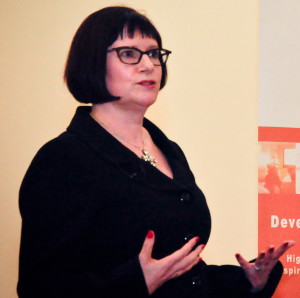
The human voice can express itself in so many ways – on the outside and the inside. Your speaking voice.
Your singing voice.
Your tone of voice – both vocal and written.
Your inner voice – your intuition.
The voices in your head – from the inner critic to the inner champion.
We speak of “finding our voice” even if we’re already articulate. And we talk of “giving someone a voice” if they are unable to tell their story.
I found my singing voice in childhood – I performed for family members from the age of two – and went on to sing backing vocals in a successful pub-rock band in my early 20s.
I was fortunate enough to find my writing voice soon after, when I was free to express my views in the music press. I went on to develop this voice over the years, in many different publications, including national newspapers. This voice became my place of safety, my mode of expression.
But as I sailed into midlife, writing started to feel more like a comfort zone.
Words mean more than what is set down on paper. It takes the human voice to infuse them with deeper meaning. – Maya Angelou
I wanted to come out from behind the glass – and that meant public speaking, of which I had little experience. Back in 1988, when I was the editor of a pop magazine, I was invited to speak at the Oxford Union – the world’s most famous debating society.
It was a surreal and intimidating experience, standing up in front of all those Oxford University students, and speaking for the motion: “Has rock ‘n’ roll lost its balls?” The motion was carried, but reading my speech from a sheaf of notes undermined my impact.
Many years later, I found myself at a taster workshop run by public speaking expert Sarah Lloyd-Hughes, where I learnt that the power of a speaker comes from their ability to be authentic. This was a revelation: I didn’t need to hide behind the glass any more.
At the end of the evening, Sarah invited two or three people to give a short speech to the group. Despite extreme resistance, I got myself to the front of that room and spoke, unrehearsed, for two minutes about how I’d been performing all my life and that this was the first time I’d shown up as myself. At the end, I burst into tears. It was a huge moment for me: I had found my speaking voice.
The one thing that you have that nobody else has is you. Your voice, your mind, your story, your vision. So write and draw and build and play and dance and live as only you can. – Neil Gaiman
With Sarah’s help, I went on to develop my voice and presence on Ginger’s brilliant Inspiring Speakers programme, and was in an absolute daze when I won the People’s Choice award at the Gala Finale in March 2013. I had no idea my words and stories – when delivered by my speaking voice – could affect an audience in this way.
It was a huge confidence boost that directly resulted in my decision to co-host a regular storytelling event – The Story Party – with fellow Inspiring Speakers graduate, Mary Ann Mhina – that creates a safe space for ordinary people to tell the stories of their lives. Now I can stand at the front of a room and trust that I can find the words to connect with an audience.
But there was another aspect of my voice that I still didn’t quite trust – my inner voice. I had made progress with silencing the negative chatter in my mind, but the voice of my intuition has often been too quiet for me to hear, too easy to skip over or dismiss.
Everyone who wills can hear the inner voice. It is within everyone. – Mahatma Gandhi
But that all changed when I spent a week training with Javier, a Peruvian shaman, who not only approved of my intuitive readings but also taught me the power of singing the icaros – beautiful shamanic songs that reawaken our ancestral, tribal identity.
As I chanted, in a language that was so different to mine, I connected to a deeper energy in my voice as it gained power and seemed to come from an otherworldly place – somewhere primal.
I found myself in tears again when Javier told me I had the voice of a leader.
Words are beautiful but restricted. They’re very masculine, with a compact frame. But voice is over the dark, the place where there’s nothing to hang on: it comes from a part of yourself that simply knows, expresses itself, and is. – Jeff Buckley
So now, what do I do with this voice? What kind of leader will I be? Where will I speak? How will it affect my writing? My singing? My intuition? Who can I touch? Who can I inspire?
This has been my journey with voice – a journey that continues to fascinate me. What resonates with you? Have you found your true voice? Will it sing, jump off the page, inspire a movement or shout from the rooftops? Whatever your mode of expression, the world needs your true voice. Let me help you find yours.
One word expresses the pathway to greatness: voice. Those on this path find their voice and inspire others to find theirs. The rest never do. – Stephen R Covey, author of The Seven Habits of Highly Effective People
Leave a Reply